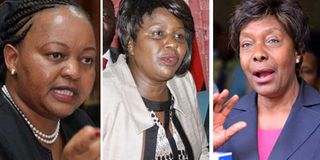Three governors signalling female leadership

From left: Governors Anne Waiguru (Kirinyaga), Joyce Laboso (Bomet) and Charity Ngilu (Kitui). PHOTOS | NATION MEDIA GROUP.
What you need to know:
- A woman, contrary to common past belief, does not only belong to the kitchen, she can also lead.
- Incidentally, the British colonial government recognised women’s leadership skills much earlier.
- In the August 8 General Election, women emerged as big winners at all levels.
The elections of August 8 have just confirmed that Kenyan voters are coming to terms with the fact that more women deserve to lead, with three women having been elected as governors for the first time.
A woman, contrary to common past belief, does not only belong to the kitchen. She can also lead.
From a then rather lonely Mrs Grace Onyango in 1969, who became the first elected woman MP (Kisumu Town), to the present 22 women in the bicameral House is an indication that Kenyan voters have come a long way, indeed.
Incidentally, the British colonial government recognised women’s leadership skills much earlier.
The Governor, Sir Patrick Renison, for instance, nominated Mrs Priscilla Abwao from Vihiga to the Legislative Council in 1961, becoming the first woman MP.
In the August 8 General Election, women emerged as big winners at all levels.
ELECTED MCAS
The 47 county assemblies have elected women MCAs, including former nominated Senator Godliver Omondi, who will now be sitting in Kakamega County Assembly as the elected Kholera Ward MCA.
Kudos also to the people of Garissa County who broke with the region’s tradition to elect Ms Sofia Abdi Noor as the MP for Ijara, becoming the first elected woman in a highly conservative Muslim region.
The numbers in the two Houses of Parliament have also swollen.
From 67 in the last Houses to 85, after nominating the 16 mandatory members to the Senate based on party strengths; and, if the parties opt to choose female youth and the disabled, there will be even more.
Rwanda became the first African country to have more women MPs than men after the 1994 genocide.
The question is whether the new trend in Kenya will be sustained in future.
But, as has often been pointed out, the real enemies of women’s liberation are not men, but the very women folk – and in two major ways.
NATIONAL POPULATION
If women were to vote for their own, the next President of Kenya would be a woman.
Though they form more than 50 per cent of the national population, they do not vote for their “tribe”.
Second, activists’ bodies such as the Federation of Women Lawyers - FIDA Kenya -- might just have misled women that they can achieve gender equality freely without sweating for it.
The 22 women who have been elected are a big lesson. The election of Ms Noor is a bigger lesson that women want to make it on their own, and not gain leadership on a silver platter.
Taking the cue from Mrs Onyango in the 197os were Mrs Anarita Karimi from Meru, Dr Julia Ojiambo from Busia, and Ms Chelagat Mutai from Nandi.
INDELIBLE MARK
They were only four but left an indelible mark in a sea of men in Parliament. Out of the 349 legislators in the bicameral House, the 85 women can stamp their presence by eclipsing their male counterparts in many ways.
They should challenge the media, engaging and receiving calls at any time to comment on issues.
They should also be ready all the time to appear on television shows as former nominated Senator Beatrice Elachi often did.
The women should initiate and push unique legislations similar to current Supreme Court Judge Njoki Ndung’u’s anti-rape law.
Then, they should continue sensitising fellow women that Kenya is, indeed, ripe for a woman President.
The arrival of three women governors, or “county presidents”, in their own right – Mrs Charity Ngilu (Kitui), Joyce Laboso (Bomet) and Anne Waiguru in Krinyaga – is a sign of things to come.
The three are, indeed, harbingers on the road to State House, and why not? Kenyan women showed the country and the world on August 8 that the sky is the limit and that State House is a possible destination.
Mr Omari is a political and social commentator. [email protected]




